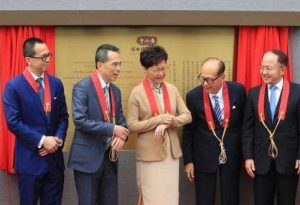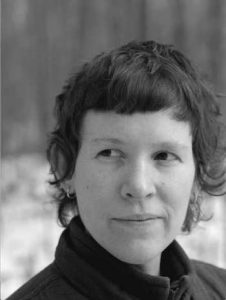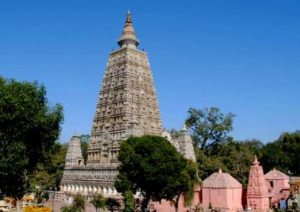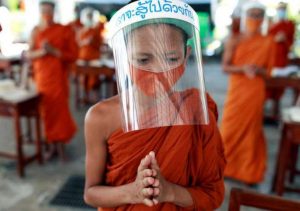
The Korean Seon (Zen) master Venerable Pomnyun Sunim (법륜스님) wears many hats: Buddhist monk, teacher, author, environmentalist, and social activist, to name a few.* As a widely respected Dharma teacher and a tireless socially engaged activist in his native South Korea, Ven. Pomnyun Sunim has founded numerous Dharma-based organizations, initiatives, and projects that are active across the world. Among them, Jungto Society, a volunteer-based community founded on the Buddhist teachings and expressing equality, simple living, and sustainability, is dedicated to addressing modern social issues that lead to suffering, including environmental degradation, poverty, and conflict.
This column, shared by Jungto Society, presents a series of highlights from Ven. Pomnyun Sunim’s writings, teachings, public talks, and regular live-streamed Dharma Q+A sessions, which are accessible across the globe. The following teaching was given at Columbia University in New York City on 29 April 2024. This article is the first in a special series taken from Ven. Pomnyun Sunim’s 2024 Dharma tour of Asia-Pacific, Europe, and North America. Titled “Casual Conversation with Ven. Pomnyun Sunim: Come Talk about Life, Wisdom, and Happiness,” the Dharma tour runs from 29 April–20 September 2024, with 13 Dharma talks currently scheduled in five countries—Australia, Canada, Germany, Japan, and the United States.**

The first day of the Dharma tour
After meeting Ven. Pomnyun Sunim at an ordination Dharma talk in Korea seven years ago, Ven. Gowoo Sunim had come to study in the United States. In 2023, she attended a Dharma Q&A that Ven. Pomnyun Sunim gave in the US, and then requested that he also give a Dharma Q&A at Columbia University.
Columbia University was experiencing heightening of tensions across its campus due to protests against the bombing of Gaza by Israel. Pro-Palestinian demonstrators had occupied Hamilton Hall on the New York campus and set up barricades. The university administration had demanded that the tents be removed or the students would face disciplinary action, and only Columbia students with valid IDs were allowed to enter the buildings.
Ven. Gowoo Sunim had prepared for Ven. Pomnyun Sunim’s Dharma Q&A with the Buddhist Student Association. Fortunately, despite the protests on campus, the university allowed the event to proceed as planned, provided that a list of pre-registered attendees was submitted and their identities verified. Students had to register once, while outsiders needed to register twice to attend the event.
On arriving at the Earl Hall Auditorium, Ven. Pomnyun Sunim was warmly welcomed by monks from temples in New York, including Wongak-sa, Wonjeok-sa, and Daegwanum-sa.
Ahead the Dharma Q&A, Ven. Pomnyun Sunim had a brief conversation with Ven, Jigwang Sunim, the abbot of Wongak-sa, and Ven. Gowoo Sunim. Ven. Jigwang Sunim had kindly prepared dinner for the audience attending the event.
“Did you face any difficulties during the COVID-19 pandemic?” Ven, Jigwang Sunim enquired. Ven. Pomnyun Sunim responded: “Yes, Jungto Society had to dismantle 200 Dharma centers and switch to an online format due to the pandemic. Our revenue decreased, but so did our expenses, so it’s been manageable. Now that we have fewer expenses, it’s safer in a way.”
Columbia University’s Prof. Janice Shin then arrived for a brief conversation with Sunim. When Ven. Pomnyun Sunim visited the US in 2023, Prof. Shin had proposed a learning project for children with disabilities in Vietnam. Sunim reiterated JTS’s principle of operating solely through volunteer work and mentioned that he would look for suitable people to conduct the project.
“JTS is operated entirely by volunteers, so we don’t spend any money on salaries,” Ven. Pomnyun Sunim explained. “We can provide food to those who need it, but we do not fund children’s college expenses because we believe that anyone who graduates from middle school or higher can make a living. JTS supports only those below the subsistence level. Individuals whose situations are above that level must support themselves. Buddhism teaches living at the minimum level of consumption, so individuals are free to earn more money, but JTS does not provide support for that. Therefore, we operate based on the principle of volunteerism. Still, we’ll see if there’s a way to make use of your expertise.”
Why Buddhism is essential for modern people
As the Dharma Q&A commenced. Ven. Gowoo Sunim gave a detailed introduction of Ven. Pomnyun Sunim for the audience, who responded with enthusiastic applause.
Ven. Pomnyun Sunim: The Buddha was born into a life of privilege. He was a prince envied by many. However, he was deeply troubled. The philosophies and religions of his time did not solve human suffering. Thus, he began to explore the question of why people suffer. Had he been poor and of low status, he might have prayed for wealth or higher status. But having no need for anything more, he instead explored human suffering.
I believe this mirrors our reality today. Most of us don’t struggle with daily needs like eating, dressing, or sleeping. Indeed, people from the past would wonder what troubles us. Yet, are we not troubled today? Do we not have worries? Thus, the issue that the Buddha addressed 2,600 years ago transcends time and applies to us today.
The Buddha’s first question was: “Why do people suffer?” If you look at your life and realize that you have various worries and sufferings, you share the Buddha’s concern.
His second question was: “Do you want to continue living in suffering?” If not, you must explore the causes of suffering. Suffering isn’t innate. It’s neither a result of past lives nor divine will. It arises from specific causes. Identifying and eliminating these causes can free us from suffering. The Buddha paved the way for us to live without suffering.
The ultimate goal of Buddhism isn’t to be reborn in a better place, or to become wealthy in the next life, or to receive blessings in this life. It’s about how to live freely and happily without suffering and stress. This is the original teaching of Buddhism. Therefore, in our conversation today I would like to narrow the scope of Buddhism. I want to focus our discussion not on Buddhism as a religion or philosophy, but as a practice for living without suffering.
I believe that the essence of Buddhist practice lies not so much in studying religious topics such as, “What is Buddhism?” but rather in the process of resolving the personal afflictions and questions you may have. I encourage you to share your troubles and questions freely today, and through our conversation, we can move toward a perspective free from suffering. Dharma talks do not necessarily have to be about Buddhist stories found in the sutras. If, in the course of talking about your afflictions, they dissipate, then that in itself is a Dharma talk.
I’m afraid of the swift passage of time
Q: I’m afraid of time passing too quickly. I had to part from my family and friends to come here to Columbia University. When I feel sad, time passes slowly. Then, when I feel happy, time flies. But these days, time passes quickly, whether or not I’m happy. Everything in my life is changing. I’m afraid that time is passing so quickly.
Ven. Pomnyun Sunim: That’s just your perception. You are free to think as you wish. If thinking this way makes you happy, you can continue doing it. However, if it causes suffering, I advise you to change it. In truth, time is neither fast nor slow. It merely changes.
Q: Yes, I understand. Whenever I think about my past memories, such as breaking up with my girlfriend, I feel sad. Even when I’m happy, I feel sad when I reminisce about the past.”
Ven. Pomnyun Sunim: Why dwell on sad memories? Do you want to live in misery? If so, continue to dwell on those thoughts. Otherwise, you must shake them off. Watch a movie or go for a run to distract yourself. Imagine someone gives you a gift, and you happily open it only to find it’s trash. What would you do?
Q: I would feel disappointed and throw it away.
Ven. Pomnyun Sunim: You say you’d throw it away, but why do you keep carrying it around and reopening it? Just when you might forget, you remind yourself by reopening it and torment yourself by thinking, “How could they give me trash?” If someone presents you with trash, just recognize it as trash and throw it away. If you want to cling to the past, you’re free to do so, but it’s foolish. The teaching of the Buddha emphasizes being awake in the here and now.
Q: I don’t think I conveyed my question clearly. My point is that even from unpleasant memories, I always manage to learn something or obtain a lesson. So I long for my past memories because they are helpful for me.
Ven. Pomnyun Sunim: Being nostalgic about the past means you like living the way you have been, right? If you like living that way, continue dwelling on old memories.
In my view, breaking up isn’t necessarily a bad thing. You may have broken up, but you’ve dated someone, haven’t you? I am doing fine despite never having dated anyone, so why can’t you? (Audience laughter) In a way, a breakup can be an opportunity for you to date new people. If you move from one relationship to another, you may face criticism. But if the other person breaks up with you, you won’t be criticized whomever you choose to date afterward. If they break up with you, just say, “Thank you.” (Audience laughter)
Actually, it’s not a big deal. The root cause of suffering is ignorance. To elaborate, the first cause is desire, the second is karma—the urge to act according to our habits—and the third is ignorance due to not understanding the true nature of things. Buddhism describes these three causes of suffering as the three poisons: greed, anger, and ignorance. These are the toxic elements of our mental functions.
Don’t memorize the Buddha’s teachings like a doctrine. Instead, as you continue to practice, apply them in your life to answer the question, “Why does suffering occur?” As I mentioned earlier, the issues that the Buddha was concerned with are similar to the issues we face today. Therefore, there’s no need to reinterpret the Buddha’s teachings in a modern context. The original perspective still applies and can solve the problems we face today. This path is an ancient road leading to the future; it has existed since the past and will continue into the future.
At the conclusion of the Dharma Q&A, Ven. Pomnyun Sunim spoke with a Thai monk seated in the front row, “Did you understand the things I said?”
“I didn’t catch everything, but I grasped the essence,” the monk replied.
A western Buddhist monk came forward to thank Ven. Pomnyun Sunim, and showed respect by touching his feet. “I really appreciated today’s Dharma talk,” he said.
At Ven. Gowoo Sunim’s request, Ven. Pomnyun Sunim participated in the ritual bathing of an image of the baby Buddha. After the ritual, many attendees came forward to express their gratitude.
“I really appreciated today’s Dharma Q&A. I’m a graduate of the English Jungto Dharma School, and I’m really looking forward to the Sutra Course,” Ven. Gowoo Sunim emphasized.
Another attendee expressed thanks: “Your Dharma talk was a great help during these tough times. Thank you.”
When it came time to leave, Ven. Gowoo Sunim accompanied Ven. Pomnyun Sunim out: “Today’s talk was wonderful. I really wanted the Columbia students to hear your teachings. I’m glad I could realize this dream before graduating. It was even more meaningful since the event coincided with the protests at the school.”
Ven. Gowoo Sunim attempted to offer a donation to Ven. Pomnyun Sunim as a token of gratitude, but he respectfully declined.
“Please use it for the Buddhist Student Association,” Ven. Pomnyun Sunim remarked. “First, I don’t accept monetary compensation after Dharma Q&As. Secondly, since Jungto Society has transitioned online, the contributions from our members alone are sufficient. We can manage without this money.”
Ven. Gowoo Sunim thanked Ven. Pomnyun Sunim again before saying goodbye.
* Buddhist Monk Ven. Pomnyun Sunim Awarded the 37th Niwano Peace Prize (BDG)
See more
Pomnyun
Jungto Society
JTS Korea
JTS America
International Network of Engaged Buddhists
Related features from BDG
Walking a New Path
Give Peace a Chance
Why Does Suffering Occur?
If We Are Alive Now, We Are All Successful
Leaving the Door to Opportunity Open
Are You Happy?
The Path without Suffering
Be Free from Suffering
Living a Life without Suffering
Live Life Lightly
Prostrating as a Part of Buddhist Practice
Suffering and the Significance of Insignificance
Treasure the Present and Value Your Own Life
Free Will and Freedom from Suffering
Do Not Sacrifice Later for Now
Begin Life Now
Becoming the Master of Your Own Life
You Are Alive Today
Everyone Has the Right to be Happy
Personal Action to Mitigate the Climate Crisis
Awareness, the Beginning of Change
How to Live Life More Freely
Related videos from BDG
Dharma Q+A with Ven. Pomnyun Sunim
Wisdom Notes from Ven. Pomnyun Sunim




























